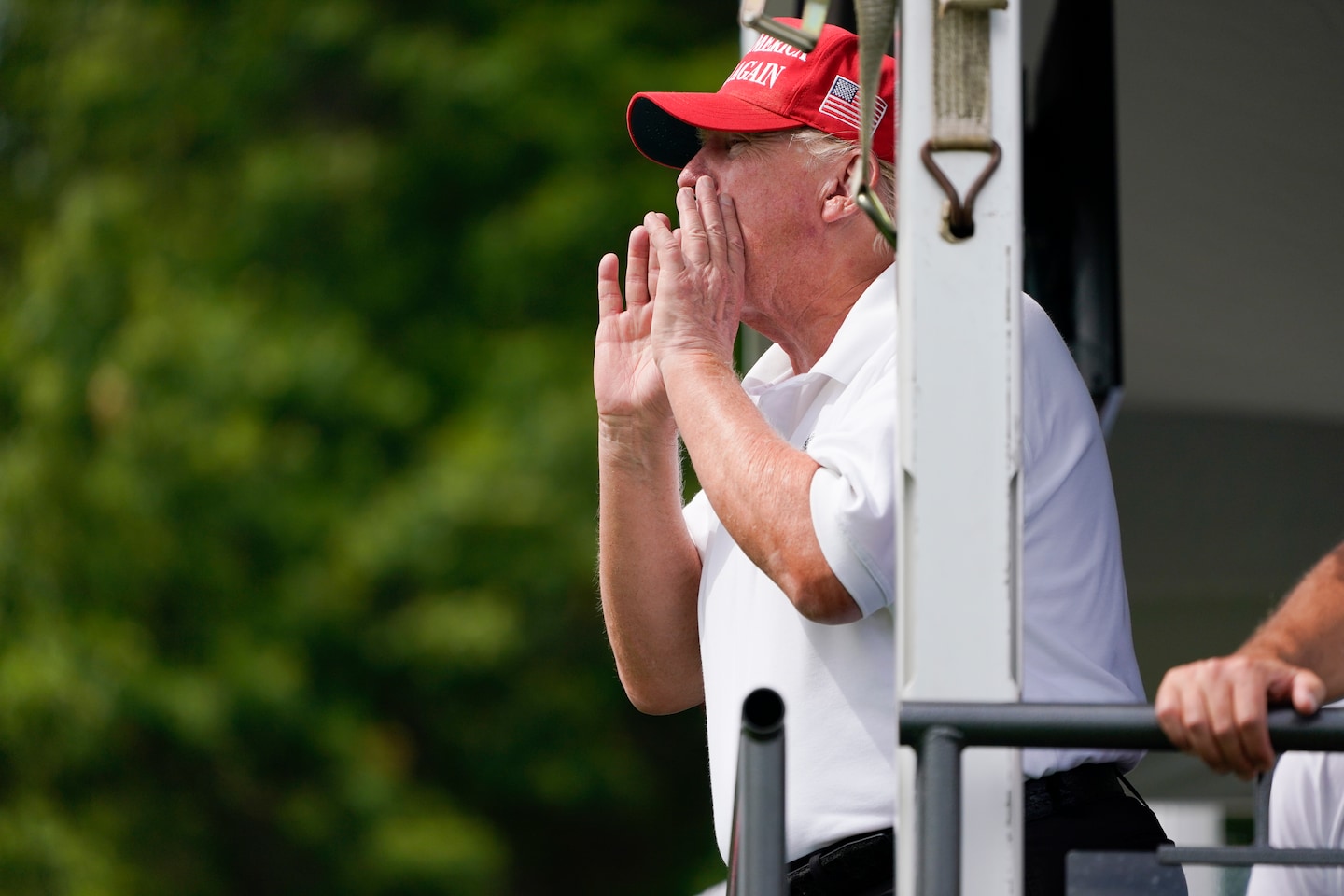What may have doomed former Missouri governor Eric Greitens’s chances of receiving an unqualified endorsement from former president Donald Trump in his bid for the state’s open Senate seat is a spate of recent polls showing him lagging further behind his rival, Attorney General Eric Schmitt. Any political endorsement is a balance between the endorser’s political worldview and the viability of the candidate, but, for Trump, the latter more frequently tips the scales.
Politics
Analysis | In Missouri, we see the quintessence of Trump politics – The Washington Post

Trump boasts constantly about his success in promoting primary candidates; if he runs in 2024 and falls behind, it would be perfectly reasonable to expect him suddenly to endorse whoever was beating him.
In Missouri, he did something nearly as odd. Late on Monday, about 24 hours before polls closed in the state, Trump announced his endorsement:
“ERIC.”
At some point in the next few days or weeks, there will be a detailed description of the decision-making process behind the endorsement. We can sketch it out in broad strokes now: Torn between Greitens and Schmitt, Trump theorizes about doing a dual endorsement (as he has elsewhere). His daughter Ivanka thinks it’s a great idea. But then he says, “What if I just endorsed ‘Eric’?” Those within earshot in the dining room at Bedminster break out into guffaws; Ivanka nods in awe. Dan Scavino is tasked with writing up the Truth Social “truth” and — after Trump suggests that “Eric” be fully capitalized — the world is let in on the joke.
(Sure enough, as this article was being edited, Politico published a narrative first pass at the endorsement. It doesn’t mention Ivanka.)
In any case, it’s not a joke, is it? Trump’s fundamental desire to be admired pulls him in two directions here.
Greitens is a prototypical right-wing tough guy, releasing ads casually suggesting hunting down his political opponents. His campaign was hobbled, in part, by public attention focused on a variety of grim allegations of abuse from his former wife (that he denies). But this persona, coupled with his fervent advocacy for Trumpism, appeals to the former president.
“Eric is tough and he’s smart,” Trump said last month, referring to Greitens. “A little controversial, but I’ve endorsed controversial people before.” Notice that he starts with “tough,” viewing the controversy as little more than a possible wrinkle.
Schmitt is not similarly controversial. Like many Republican primary candidates, he has worked to appeal to Trump and Trump’s base. That included a trip to Mar-a-Lago for a fundraiser where Trump spoke. But, as The Washington Post’s David Weigel reported, he understood that his best card was his increasing lead in polling; Trump, he said, was probably “aware of the separation in the polls this last week.”
When Trump’s “ERIC” endorsement was offered, the immediate response was to wonder if Trump would clarify his intent. Greitens and Schmitt alike quickly jumped on social media to express their appreciation for the endorsement, which one would certainly expect from a candidate for office. Each man also spoke with Trump and thanked him for the endorsement, Weigel reported, removing any question about what was intended. This was a dual endorsement, couched as a winking endorsement of just one person.
In that, it’s a perfect distillation of how Trump has played Republican politics for the past seven years. His rise was a function of his willingness to embrace the party’s rightmost fringe, but his true skill was in being able to talk to both the fringe and the establishment base — and have each hear what it wanted to hear. He could make a comment about, say, immigration that nodded at what was burbling on Breitbart but which Republican donors could hear as relatively mainstream. He would make “jokes” that his base knew were intended seriously.
The “ERIC” endorsement is that, but explicit. He’s telling both segments of the party what they want to hear and pretending it’s all tongue-in-cheek. The fringe will be happy that Greitens got a nod, however indirect, and the establishment will be happy that Schmitt was in the mix. As always, Trump aims to remain palatable to, if not popular with, everyone in his party.
And, assuming that one of the Erics wins, Trump is well-positioned for the follow-up. Let’s say the victor is Schmitt. Trump will say that he won because of his last-minute endorsement, “joking” that Schmitt is who he meant all along. He’ll tack the victory on to his total as readily as he skips including the races in which his candidates lose. Over time, he’ll just talk about how he endorsed Schmitt all along.
Look, endorsers do this stuff all the time. Part of the process of making an endorsement is touting the endorsement; endorsements are made to build political power, and demonstrating the weight of one’s endorsement is a tool for building that power. For Trump, though, it’s slightly different. It’s about building political power, yes, but as a way of building his own sense of self, his own brand.
What it isn’t, really, is a statement of principle. Trump’s task in endorsing is made easier by so many primary candidates having signed on to his political agenda — because that agenda is sparse to the point of translucency. People are signing on to MAGAism knowing that the constituent elements of MAGAism are fungible; the main component is loyalty to Trump. So when Trump endorses, he’s balancing viability not with politics but with fealty.
Greitens won on fealty. Schmitt appears to be winning on viability. So Trump combines them — endorsement to ERIC! — and, with seven years of practice at playing both sides, will emerge a winner either way.
Unless Rep. Vicky Hartzler (R-Mo.) gets the most votes in the primary.
Politics
‘Disgraceful:’ N.S. Tory leader slams school’s request that military remove uniform

HALIFAX – Nova Scotia Premier Tim Houston says it’s “disgraceful and demeaning” that a Halifax-area school would request that service members not wear military uniforms to its Remembrance Day ceremony.
Houston’s comments were part of a chorus of criticism levelled at the school — Sackville Heights Elementary — whose administration decided to back away from the plan after the outcry.
A November newsletter from the school in Middle Sackville, N.S., invited Armed Forces members to attend its ceremony but asked that all attendees arrive in civilian attire to “maintain a welcoming environment for all.”
Houston, who is currently running for re-election, accused the school’s leaders of “disgracing themselves while demeaning the people who protect our country” in a post on the social media platform X Thursday night.
“If the people behind this decision had a shred of the courage that our veterans have, this cowardly and insulting idea would have been rejected immediately,” Houston’s post read. There were also several calls for resignations within the school’s administration attached to Houston’s post.
In an email to families Thursday night, the school’s principal, Rachael Webster, apologized and welcomed military family members to attend “in the attire that makes them most comfortable.”
“I recognize this request has caused harm and I am deeply sorry,” Webster’s email read, adding later that the school has the “utmost respect for what the uniform represents.”
Webster said the initial request was out of concern for some students who come from countries experiencing conflict and who she said expressed discomfort with images of war, including military uniforms.
Her email said any students who have concerns about seeing Armed Forces members in uniform can be accommodated in a way that makes them feel safe, but she provided no further details in the message.
Webster did not immediately respond to a request for comment.
At a news conference Friday, Houston said he’s glad the initial request was reversed but said he is still concerned.
“I can’t actually fathom how a decision like that was made,” Houston told reporters Friday, adding that he grew up moving between military bases around the country while his father was in the Armed Forces.
“My story of growing up in a military family is not unique in our province. The tradition of service is something so many of us share,” he said.
“Saying ‘lest we forget’ is a solemn promise to the fallen. It’s our commitment to those that continue to serve and our commitment that we will pass on our respects to the next generation.”
Liberal Leader Zach Churchill also said he’s happy with the school’s decision to allow uniformed Armed Forces members to attend the ceremony, but he said he didn’t think it was fair to question the intentions of those behind the original decision.
“We need to have them (uniforms) on display at Remembrance Day,” he said. “Not only are we celebrating (veterans) … we’re also commemorating our dead who gave the greatest sacrifice for our country and for the freedoms we have.”
NDP Leader Claudia Chender said that while Remembrance Day is an important occasion to honour veterans and current service members’ sacrifices, she said she hopes Houston wasn’t taking advantage of the decision to “play politics with this solemn occasion for his own political gain.”
“I hope Tim Houston reached out to the principal of the school before making a public statement,” she said in a statement.
This report by The Canadian Press was first published Nov. 8, 2024.
The Canadian Press. All rights reserved.
Politics
Saskatchewan NDP’s Beck holds first caucus meeting after election, outlines plans

REGINA – Saskatchewan Opposition NDP Leader Carla Beck says she wants to prove to residents her party is the government in waiting as she heads into the incoming legislative session.
Beck held her first caucus meeting with 27 members, nearly double than what she had before the Oct. 28 election but short of the 31 required to form a majority in the 61-seat legislature.
She says her priorities will be health care and cost-of-living issues.
Beck says people need affordability help right now and will press Premier Scott Moe’s Saskatchewan Party government to cut the gas tax and the provincial sales tax on children’s clothing and some grocery items.
Beck’s NDP is Saskatchewan’s largest Opposition in nearly two decades after sweeping Regina and winning all but one seat in Saskatoon.
The Saskatchewan Party won 34 seats, retaining its hold on all of the rural ridings and smaller cities.
This report by The Canadian Press was first published Nov. 8, 2024.
The Canadian Press. All rights reserved.
Politics
Nova Scotia election: Liberals say province’s immigration levels are too high

HALIFAX – Nova Scotia‘s growing population was the subject of debate on Day 12 of the provincial election campaign, with Liberal Leader Zach Churchill arguing immigration levels must be reduced until the province can provide enough housing and health-care services.
Churchill said Thursday a plan by the incumbent Progressive Conservatives to double the province’s population to two million people by the year 2060 is unrealistic and unsustainable.
“That’s a big leap and it’s making life harder for people who live here, (including ) young people looking for a place to live and seniors looking to downsize,” he told a news conference at his campaign headquarters in Halifax.
Anticipating that his call for less immigration might provoke protests from the immigrant community, Churchill was careful to note that he is among the third generation of a family that moved to Nova Scotia from Lebanon.
“I know the value of immigration, the importance of it to our province. We have been built on the backs of an immigrant population. But we just need to do it in a responsible way.”
The Liberal leader said Tim Houston’s Tories, who are seeking a second term in office, have made a mistake by exceeding immigration targets set by the province’s Department of Labour and Immigration. Churchill said a Liberal government would abide by the department’s targets.
In the most recent fiscal year, the government welcomed almost 12,000 immigrants through its nominee program, exceeding the department’s limit by more than 4,000, he said. The numbers aren’t huge, but the increase won’t help ease the province’s shortages in housing and doctors, and the increased strain on its infrastructure, including roads, schools and cellphone networks, Churchill said.
“(The Immigration Department) has done the hard work on this,” he said. “They know where the labour gaps are, and they know what growth is sustainable.”
In response, Houston said his commitment to double the population was a “stretch goal.” And he said the province had long struggled with a declining population before that trend was recently reversed.
“The only immigration that can come into this province at this time is if they are a skilled trade worker or a health-care worker,” Houston said. “The population has grown by two per cent a year, actually quite similar growth to what we experienced under the Liberal government before us.”
Still, Houston said he’s heard Nova Scotians’ concerns about population growth, and he then pivoted to criticize Prime Minister Justin Trudeau for trying to send 6,000 asylum seekers to Nova Scotia, an assertion the federal government has denied.
Churchill said Houston’s claim about asylum seekers was shameful.
“It’s smoke and mirrors,” the Liberal leader said. “He is overshooting his own department’s numbers for sustainable population growth and yet he is trying to blame this on asylum seekers … who aren’t even here.”
In September, federal Immigration Minister Marc Miller said there is no plan to send any asylum seekers to the province without compensation or the consent of the premier. He said the 6,000 number was an “aspirational” figure based on models that reflect each province’s population.
In Halifax, NDP Leader Claudia Chender said it’s clear Nova Scotia needs more doctors, nurses and skilled trades people.
“Immigration has been and always will be a part of the Nova Scotia story, but we need to build as we grow,” Chender said. “This is why we have been pushing the Houston government to build more affordable housing.”
Chender was in a Halifax cafe on Thursday when she promised her party would remove the province’s portion of the harmonized sales tax from all grocery, cellphone and internet bills if elected to govern on Nov. 26. The tax would also be removed from the sale and installation of heat pumps.
“Our focus is on helping people to afford their lives,” Chender told reporters. “We know there are certain things that you can’t live without: food, internet and a phone …. So we know this will have the single biggest impact.”
The party estimates the measure would save the average Nova Scotia family about $1,300 a year.
“That’s a lot more than a one or two per cent HST cut,” Chender said, referring to the Progressive Conservative pledge to reduce the tax by one percentage point and the Liberal promise to trim it by two percentage points.
Elsewhere on the campaign trail, Houston announced that a Progressive Conservative government would make parking free at all Nova Scotia hospitals and health-care centres. The promise was also made by the Liberals in their election platform released Monday.
“Free parking may not seem like a big deal to some, but … the parking, especially for people working at the facilities, can add up to hundreds of dollars,” the premier told a news conference at his campaign headquarters in Halifax.
This report by The Canadian Press was first published Nov. 7, 2024.
— With files from Keith Doucette in Halifax
-

 News13 hours ago
News13 hours agoChrystia Freeland says carbon rebate for small businesses will be tax-free
-

 Business24 hours ago
Business24 hours agoJapan’s SoftBank returns to profit after gains at Vision Fund and other investments
-

 News24 hours ago
News24 hours agoSTD epidemic slows as new syphilis and gonorrhea cases fall in US
-

 News13 hours ago
News13 hours agoSwearing-in ceremonies at B.C. legislature mark start of new political season
-

 News13 hours ago
News13 hours agoNew Brunswick premier confirms her Liberal government will draft carbon pricing plan
-

 News13 hours ago
News13 hours agoFormer B.C. premier John Horgan, who connected with people, dies at 65
-

 News13 hours ago
News13 hours agoB.C. teen with bird flu is in critical care, infection source unknown: health officer
-

 News13 hours ago
News13 hours agoFederal government launching research institute for AI safety































